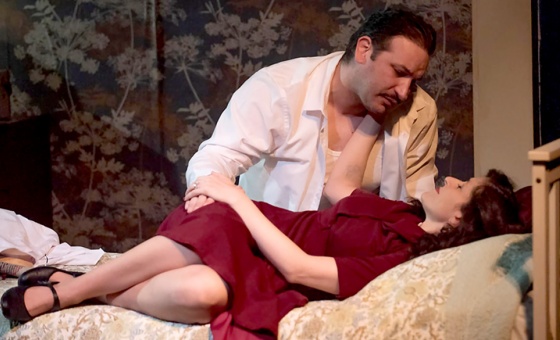This is the last article you can read this month
You can read more article this month
You can read more articles this month
Sorry your limit is up for this month
Reset on:
Please help support the Morning Star by subscribing here
A HOSPITAL in Glasgow in July 2015. A consultant speaks frankly to me: “Mr Holman, I am sorry to say that you have motor neurone disease.”
For months, I had been under several departments for difficulties in swallowing and coughing fits, loss of use in my right hand, breathlessness and problems with my voice. Then it was brought together by the neurology department — motor neurone disease (MND).
MND is a rare but deadly disease. It involves the decline in use of nerves and muscles with the sufferer unable to carry out basic tasks.
There is no cure and it often leads to a short life span. I was told I probably about a year to live. Already my lifestyle has changed considerably.
My diet consists of easy-to-swallow food, well prepared by my wife, Annette. The slow chewing means that it can take 50 minutes to consume breakfast, often accompanied by coughing.
Consequently, I cannot eat in cafes or restaurants. My voice is difficult to understand and will eventually go altogether.
I can no longer speak at public meetings. I am reluctant to talk on the phone or to go into shops on my own. I do insist on going for the papers at the local Co-op. To sleep, I have to sit upright. Yet for all of these setbacks, I do have factors which allow some contentment.
I am a Christian in a relationship with the Lord God. I do not want to die and be separated from those I love, yet I believe that my death will take me to the Kingdom of Jesus Christ and eternal happiness.
My Christianity is also related to the example and teachings of certain Christian socialists, namely the books of Richard Tawney and the political lives of Keir Hardie and George Lansbury.
They insisted that Christians should be parts of local communities which develop and practise fellowship, particularly with those in need.
For over 30 years, I have attended the Easterhouse Baptist Church and I feel friendship with a variety of people. These include numbers of families from west Africa and asylum-seekers. Home Secretary Theresa May claims that immigrants divide communities. She is so wrong.
Just as others find help for their lack of food and money, I am helped and so are they.
I am also kept going by a local voluntary body outside of the church. Years ago, I was one of about 30 residents who formed Family Action in Rogerfield and Easterhouse (Fare) to serve local people.
From one staff member and one small room, it now has a large building and 20 staff — most of whom are local.
For years I felt I was contributing to something useful in activities which helped children who were doing badly at school, who enjoyed the clubs and holidays.
In addition, adults participated in cooking and feeding their familes, the disabled supported each other and elderly folk benefited from food and friendship.
I recently attended a gathering of over 200 people to celebrate the work of Fare. A tough young man suddenly lifted me off my feet, thanked me for my contribution and prayed for my future.
Years ago he was a violent gang member who went to prison. Later Fare changed him and now he works for the charity as a youth leader. I felt that the years I had put in had been worthwhile.
My illness has also brought me even closer to our family. My loving wife Annette and I accept the likelihood of my soon-to-come death. We have selected my grave in a field with trees and flowers but no tombstone.
Our son, David, a professor at Manchester University, visits every other weekend, often with his Glaswegian wife, Janice.
He hugs me, tells me he loves me, takes me out. In a local park we walked through the gardens.
Our daughter Ruth, a doctor, lives nearby. Often she brings our two grandsons over which also frees Annette to go to a music concert with a friend.
Nathan is 12 and on one recent visit announced that he is helping at a children’s charity as their DJ.
Lucas is just 18 and, when both parents went to work, I frequently cared for him from the age of six months.
He has done well at school but decided to take a gap year from starting university to play cricket in New Zealand. He was devastated by my illness and refused to go.
He now helps at a cafe run by our church. I was delighted when his cricketing prowess was recognised by an invitation to a formal dinner at Lord’s in November.
I am happy to be in the hands of the Scottish NHS. It is not just expert doctors at the hospital, I also receive help from a specialist nurse, dietician, speech therapist and occupational therapist at our home. They are both expert and friendly.
No doubt I will not continue to be so content. What one consultant calls “the cruel disease” is progressive and I will lose my voice altogether, perhaps lose the capacity to swallow and have to be fed externally, and lose my physical mobility.
But I will not lose my Christianity, which will be with me to the end.







